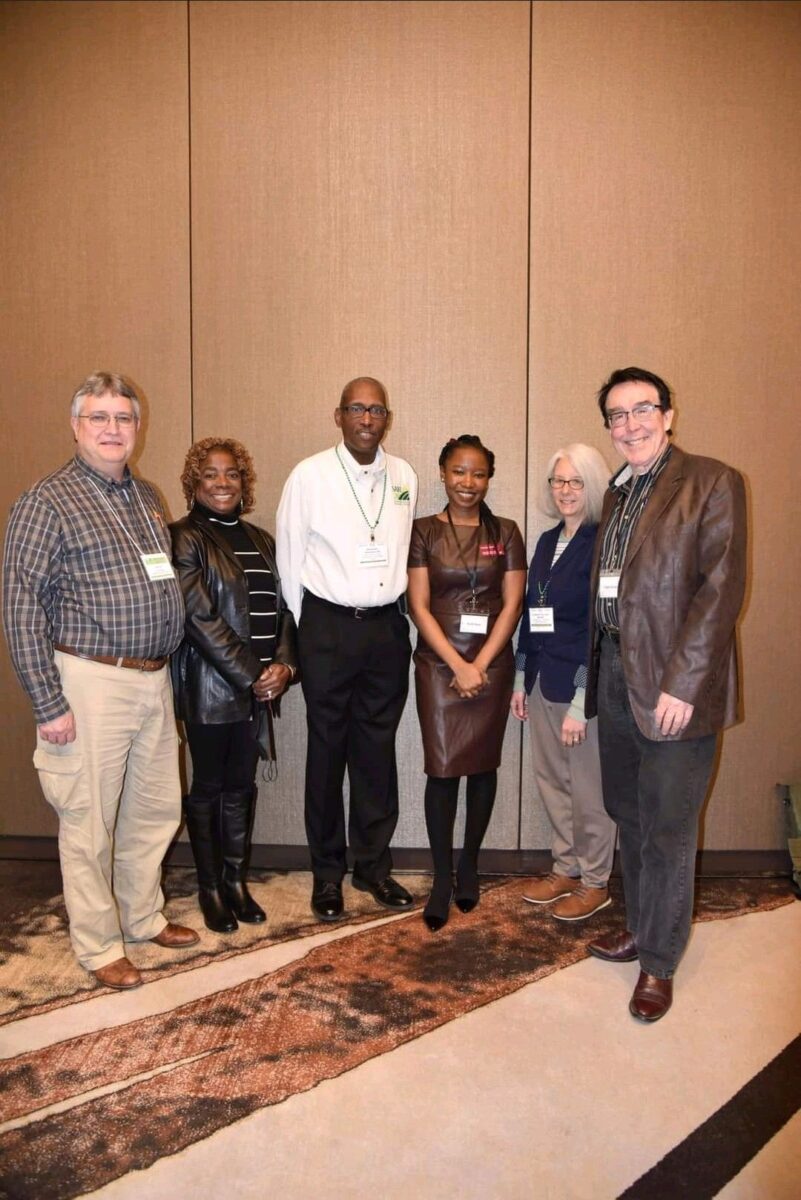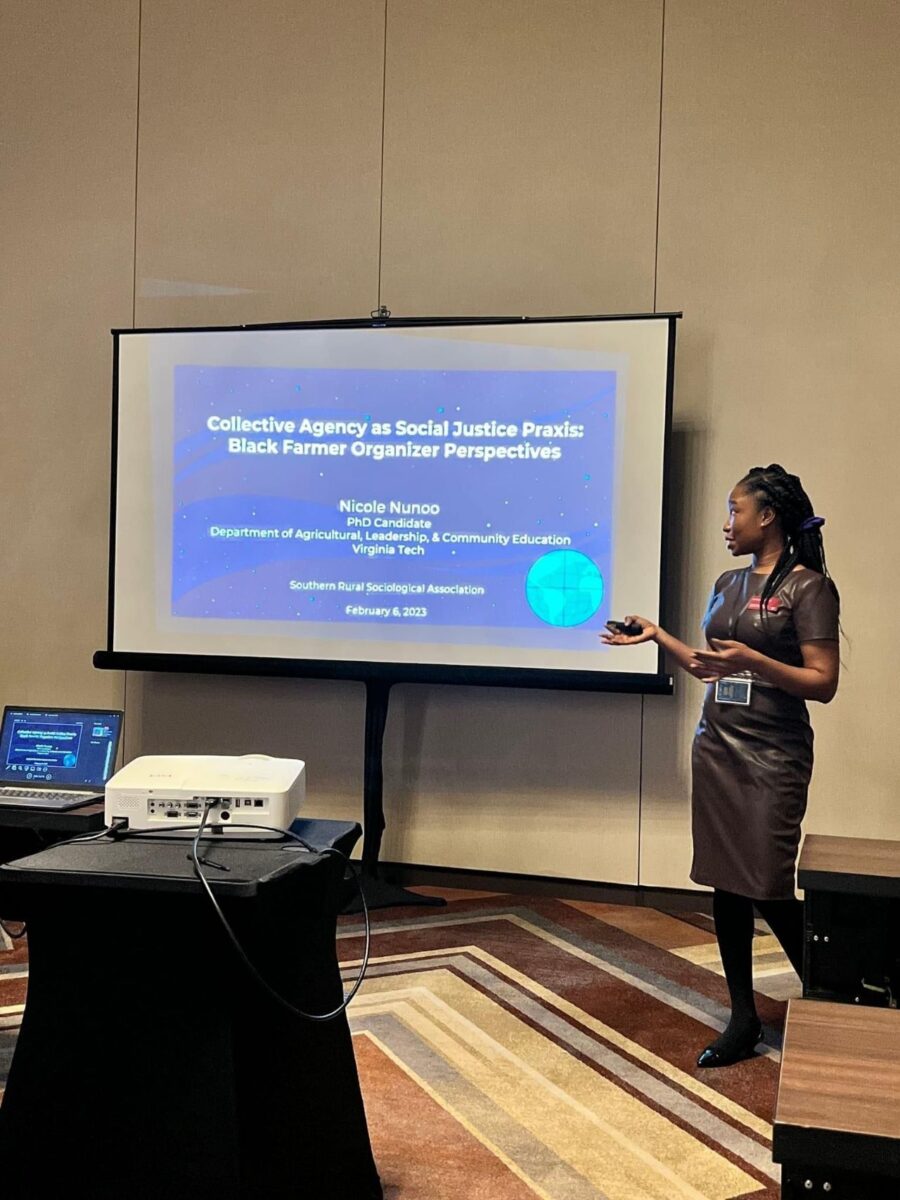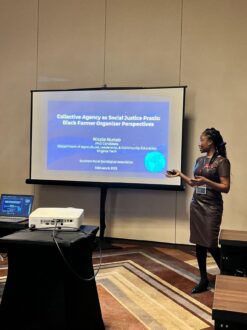BLACKSBURG, Virginia –
Seeking answers to the critical question of how contemporary Black farmer organizers and their networks actively create sustainable food systems pathways, Nicole I. Nunoo, at Virginia Tech, used a Southern SARE graduate student grant to employ a community-based case study of Black farmers who are at the forefront of sustainable agricultural development in Virginia.
I gained insights into the working relationships and the strategies employed by Black farmer organizers in mitigating food access issues. In addition, I was able to build networks with multiple Black farmers who are utilizing various sustainable agricultural practices and are also using their farms as spaces to create affinity groups,” said Nunoo.
Nicole I. Nunoo, SSARE Graduate Student Awardee
Twenty-five farmers and thirty agriculture professionals participated in educational and outreach activities including three tours and three presentations in person and online. Focusing on researching methods that encourage sustainable communities, community development, local and regional food systems, new business opportunities, and sustainability measures, this project addressed the challenges related to the quality of life and farmer profitability pillars of the SARE sustainable agriculture definition.
Originally from Ghana, Nunoo expressed that the concept of Black was somewhat foreign to her until she arrived in the United States. As she began studying her community and learning from her environment, she noticed various disparities and wanted to understand why they existed. Noting her interests, Michael Carter, Jr., Director and owner of Carter Farms and Africulture a non-governmental nonprofit organization in Orange, Virginia introduced Nunoo to her Virginia Tech faculty advisor Kim Niewolny.
Nicole’s objectives were to understand how Black farmer organizers and their networks and synergies are building sustainable local food access pathways. She also wanted to identify recommendations for sustainable community development through Black farmer-led initiatives as illustrations of self-determination and community resiliency. Finally, she intended to determine the contemporary patterns leading to the decline of Black farmers.
According to Nicole’s final report, Black farmers play an integral role in cultivating sustainable agricultural systems and promoting viable economic development yet the number of Black farmers in the U.S. is steadily declining posing a risk to sustainable agricultural development and socially just food access in the U.S. These farmers are food production and access leaders in both rural and urban communities.
For such an important contribution, Nicole realized that little is still known regarding how the collective leadership of Black farmers shapes the creation and trajectory of sustainable food systems in local communities. Her project helps to fill that gap through a community-based case study approach with Black farmer organizers in the Commonwealth of Virginia, who are actively farming and providing local leadership to address the core goals of sustainable food system development (i.e., soil health, food access, social justice, and economic wealth) in their communities. Her study also aligns the findings through a collective agency lens for analyzing the synergies embedded in the Black farmer networks and how they are building sustainable local food access pathways.
Nicole with members of the Southern SARE team and presenting at the 2023 Southern Rural Sociological Association (SRSA) Conference


Preliminary findings from this SARE-funded research were shared at the 2023 Southern Rural Sociological Association’s conference in Oklahoma City, the Virginia Tech Graduate Students’ Research Symposium, the ALCE Symposium, and the Ujima Jams with Black farmers from the Mid-Atlantic regions. Abstracts were also accepted for the Agriculture, Food, and Human Values Society conference, where the findings were also presented.
The study focused on the quality-of-life component of the sustainable agriculture pillars. The student identified recommendations for sustainable community development through agriculture led by Black farmers as illustrations of self-determination and community resiliency. These findings are of significant benefit to community stakeholders, local food movement actors, sustainable agriculture service providers, extension professionals, and rural/urban farmers. Although the study is specific to Virginia, the research may have broader implications for similar geographical regions.
To learn more about this project and others funded by Southern SARE, visit https://projects.sare.org/search-projects/ to search all projects.
Note: As of Spring 2024, Nunoo is a post-doctoral research assistant at the University of Georgia.
